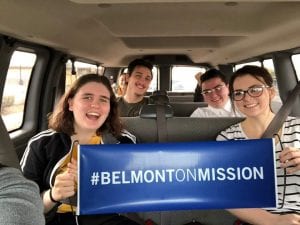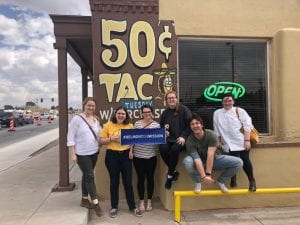I once heard that “you can’t hate someone whose story you know.” The El Paso trip is about coming to know the stories of our neighbors more than anything else. To bear witness to the difficulties in their journeys, the complexities of the systems through which they are processed, and the hope and faith that they cling to in the midst of it all.

On Monday night, a warm older woman named Carmen came to the church we are staying at to teach us how to make gorditas and share her own story with us. I watched as she expertly placed the masa in the oiled pan to fry, and spoke with her in Spanish in short turns. Making a meal alongside along another immersion group from the University of South Florida with Carmen was a lesson in patience as the entire first two Spanish dubbed Madagascar movies played in the background during the time that we were cooking. After lunch, she spoke to us with the help of our hostess translating of the journey which she has endured as an immigrant. Seeking medical treatment for her adopted daughter, Carmen left Juarez, Mexico and came to El Paso. Tears formed in her eyes as she spoke of doctors who appeared as “angels” and gave her daughter the kidney transplant she needed without the sufficient funds or health insurance, and of the process of getting documents which she had not originally intended to pursue. The profundity of her faith shone as she told us about entrusting her child to God in her child’s very hour of death, pulling all of us students into a sacred and beautiful space with her. “It is not God who has created divisions,” she told us, “it is people who have created divisions. To God, it does not matter if you are Mexican or Chinese or American. He loves everyone.”
Some of the other stories we have come into contact with are refugee families who are being hosted for a night or two by churches in the area of Las Cruces, New Mexico and El Paso, Texas. These families who are seeking asylum in the United States have just been released from the detention centers they have been held in and are about to embark on a journey to another part of the country where they will live with a host family, awaiting a trial in immigration court. These church and non-profit organization volunteers provide a place to stay, some basic resources, and help organize the travel arrangements to the host families. On the weekends, a La Quinta Inn allows these churches to organize hotel rooms for the families to stay in, and during the week, they are hosted on air mattresses in one of the rooms of a church. Volunteers help pass out donated supplies such as clothing, shoes, and plastic bags with various toiletries, as well as make meals for them. As a group, we have gotten the opportunity to serve two meals so far, one of which we cooked ourselves, to these families. Embodying solidarity, we eat alongside them and use what little or much Spanish we know to speak to them and let them know that they are seen and heard.

On Tuesday morning, we also witnessed formal snippets of immigrants’ stories through a Federal District Court’s proceedings of criminal cases. We watched defendants hear their charges for such things as “illegal entry without inspection,” which is entering the country at a place other than an official port of entry, and “reentry of a removed alien,” which is entering the country again after an individual has been deported in the past. These men pled guilty, and were led out in handcuffs to eventually be “removed from the United States, denied citizenship, and denied admission to the United States in the future.”
An immersion trip to El Paso is an immersion into stories, the realities of our neighbor’s lives, and an education on the deep complexity of the issues and experiences encountered along the U.S./Mexico border. Hearing and seeing stories help us become informed, and spark our compassion for our brothers and sisters in the borderland regions who, as Carmen called it, “live in the shadows.”
— Hannah Rae Melis, El Paso Trip Student Leader
